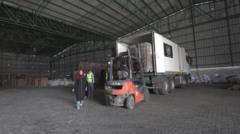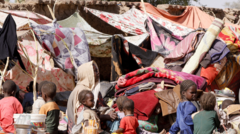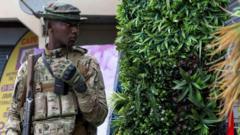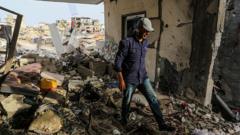The recent unrest in Amsterdam, sparked by an attack on Israeli football fans, has unveiled the fragile relations between the Jewish and Muslim communities in the city. With allegations of antisemitism and a political fallout, local leaders stress the urgent need for healing and understanding among diverse groups.
Amsterdam's Unrest: A Reflection on Division within Dutch Society
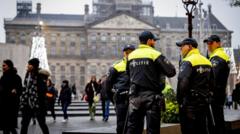
Amsterdam's Unrest: A Reflection on Division within Dutch Society
Recent violence in Amsterdam highlights deep-seated tensions between Jewish and Muslim communities, fueled by the ongoing conflict in Gaza and political instability.
Tensions in Amsterdam have escalated following last week's violent clashes involving Israeli football fans, leaving the Dutch capital grappling with a challenging aftermath. City officials attribute the unrest to a perilous mix of antisemitism, hooliganism, and general anger tied to the ongoing conflict in Gaza and the broader Middle East.
As the city attempts to restore calm, concerns grow over the damage inflicted on relationships between Amsterdam's Jewish and Muslim communities. The city had already experienced increased protests due to the war, stirring local Rabbi Lody van de Kamp to express that the environment had become a powder keg, particularly with the arrival of 2,000 Israeli football supporters for a Europa League match against Ajax.
On the eve of the match, videos circulated showing fans tearing down and burning a Palestinian flag, which many perceived as a deliberate act of provocation. A report from local authorities detailed multiple incidents of vandalism attributed to Maccabi supporters, alongside violent assaults targeting both Israeli supporters and nightlife crowd in the area. This unrest has raised alarms among the municipal leadership, with Mayor Femke Halsema emphasizing the alarming nature of the violence, drawing parallels to historical instances of persecution against Jews.
The timing of these clashes coincided with the anniversary of Kristallnacht, a historical pogrom against Jewish populations, further exacerbating fears within the Jewish community. In response to the violence, the Dutch government has channeled €4.5 million to combat antisemitism, with Justice Minister David van Weel asserting the necessity for Jewish citizens to feel safe.
Critics, however, argue that the political landscape has become dangerously charged. The resignation of Moroccan-born junior minister Nora Achahbar highlighted the fallout of racist rhetoric encountered within the cabinet, raising concerns about the targeting of Moroccan communities in the aftermath of the chaos.
Commentators within the Muslim community have expressed a belief that they are unjustly shouldering the blame for the actions of a minority. Writer Emine Uğur, facing heightened threats as a Muslim voice in the debate, describes an increasingly polarized societal atmosphere where the narrative surrounding community relations has shifted dangerously.
As community leaders and academics urge for solidarity and de-escalation, attention shifts toward rebuilding trust within Amsterdam's diverse society. Rabbi van de Kamp acknowledges the deep-rooted anger that exists but emphasizes that hatred should never prevail. The collective challenge ahead is to confront the underlying tensions that culminated in such violence while safeguarding the fabric of a society committed to mutual respect and understanding.








